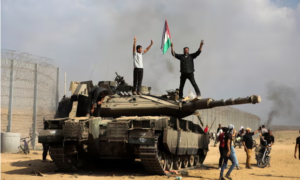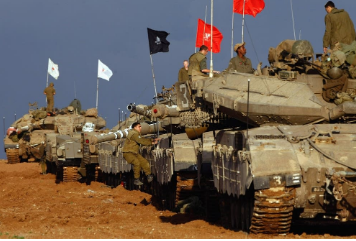The “laws of war,” also called International Humanitarian Law, refer to a group of statutes agreed upon in international conventions and treaties over the last 150 years. A series of treaties, known as the Geneva Conventions, were adopted in 1864, 1906, 1929 and 1949 to limit “the barbarity of war,” according to the International Committee of the Red Cross. The Additional Protocols of 1977, the Hague Conventions of 1899 and 1907, as well as conventional weapons conventions, are also part of International Humanitarian Law, also known as IHL.

The overriding goal of IHL is to protect civilians by restricting the actions of military forces. They are designed to protect people who do not take part in the fighting, such as civilians, medics and aid workers, as well as those who can no longer fight, such as wounded and sick combatants, and prisoners of war.
In the wake of World War II and the Holocaust, all 196 members of the newly created United Nations adopted the four original Geneva Conventions, making them one of the world’s most widely agreed upon international agreements.
There are five basic principles under International Humanitarian Law: military actions must be necessary; they must distinguish between civilians and legitimate military targets; they must be proportionate, meaning they must avoid to the extent possible incidental harm; they must avoid unnecessary suffering, sometimes referred to as humanity; and, finally, the actions taken by the military must be honorable.
The International Committee of the Red Cross, a global nonprofit based in Switzerland, is an independent, neutral organization that works to ensure “humanitarian protection and assistance for victims of armed conflict and other situations of violence.” Known as the ICRC, its mandate and mission is to take “action in response to emergencies” and promote “respect for international humanitarian law and its implementation in national law.” The ICRC can investigate allegations of war crimes, but on its own has no power to prosecute them.
“Humanitarian law does not regulate when and if wars are justified or when they can start or end,” said Ilia Utmelidze, director of the Case Matrix Network, a nonprofit group that investigates war crimes. “It is a minimum standard of protection when wars are fought.”
All signatories to the Geneva Convention are obligated to investigate and prosecute war crimes domestically if they are aware of them. But the decisions are often wrapped in politics. “Bottom line, we have the jurisprudence, the experience and the rules of procedure and evidence to prosecute those who commit war crimes,” said David Crane, an American international law expert and the founding chief prosecutor of the United Nations’ Special Court for Sierra Leone. “But the bright red thread about whether a international tribunal is convened is political, not legal.”
Crane pointed out that, nevertheless, international tribunals have been convened to prosecute war crimes in Rwanda, Sierra Leone and the former Yugoslavia, where war crimes occurred. In 1989, an effort was launched to create an International Criminal Court that would prosecute war crimes globally. The citizens or soldiers of any nation that signed a treaty known as the Rome Statute could be investigated and tried by the court for committing war crimes if such crimes are committed on the territory of this country.

